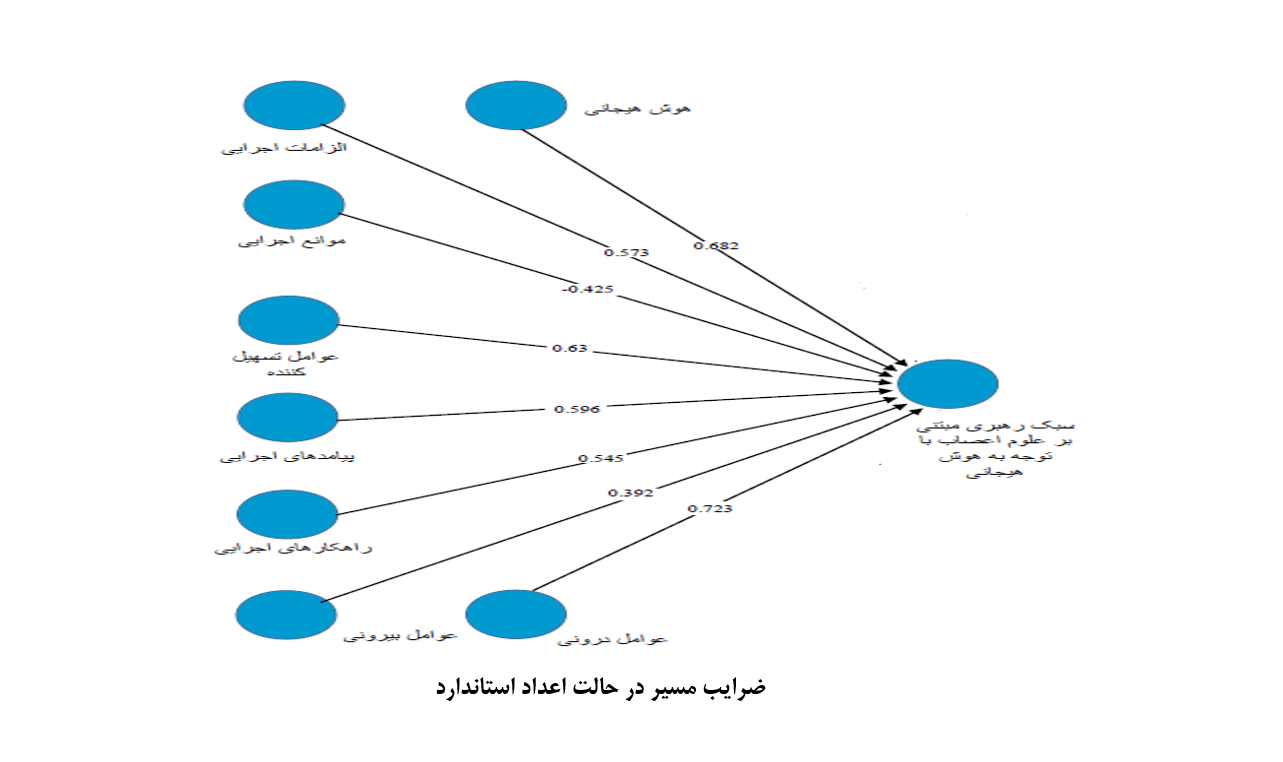Validation of the Leadership Style Selection Model Through Neuroscience-based Leadership Considering Emotional Intelligence in the Municipalities of the Country’s Metropolises
Keywords:
Validation, Leadership Style, Neuroscience-Based Leadership, Emotional Intelligence, Metropolitan Municipalities of the CountryAbstract
The purpose of this study was to validate a model for selecting leadership styles based on neuroscience, considering the role of emotional intelligence in the municipalities of the country’s metropolises. This research was applied in terms of purpose and descriptive-survey in terms of data collection method. The statistical population consisted of managers and experts working in metropolitan municipalities, from which a sample of 384 individuals was selected using stratified random sampling. The research instrument was a researcher-made questionnaire whose validity was confirmed by experts and whose reliability was verified using Cronbach's alpha and composite reliability. Data were analyzed using Structural Equation Modeling and PLS software. The findings showed that all model fit indices were at a desirable level and that the proposed model had acceptable validity. Emotional intelligence, with a path coefficient of 0.682, and internal factors, with a path coefficient of 0.723, had the highest positive impact on neuroscience-based leadership style. Furthermore, implementation barriers had a significant negative effect on the establishment of this leadership style, with a path coefficient of -0.425. Other variables, including implementation requirements, facilitating factors, implementation consequences, and implementation strategies, also had significant positive effects on the leadership style. This study demonstrated that integrating emotional intelligence and neuroscience can provide an innovative framework for developing effective leadership styles in public organizations.
Downloads
References
Haris A, Jones M, Ismail N. Distributed leadership: taking a retrospective and contemporary view of the evidence base. School Leadership & Management. 2022;52(5):438-56. doi: 10.1080/13632434.2022.2109620.
Kan J, editor Research on the relationship between leadership style and team dynamics in high-performance teams. SHS Web of Conferences; 2024.
Pope M. Systematic Review of Head Nurse Leadership Style and Nurse Performance. International Journal of Africa Nursing Sciences. 2020:100564.
Kouravand N. Neuro management and leadership. International Journal of New Findings in Health and Educational Sciences (IJHES). 2024;2(2):1-21. doi: 10.63053/ijhes.68.
Alexander R. The neuroscience of positive emotions and affect: Implications for cultivating happiness and wellbeing. Neuroscience and Biobehavioral Reviews. 2021;121:220-49. doi: 10.1016/j.neubiorev.2020.12.002.
Beard SM. The Concept of Neuroleadership Scarf Domain Theory on the Self-Efficacy and Emotional Intelligence of Executive Leadership: Trevecca Nazarene University; 2021.
Liu CC, Yeh WC, Yu Z, Lin XC. The relationships between leader emotional intelligence, transformational leadership, and transactional leadership and job performance: A mediator model of trust. Heliyon. 2020;9(8).
Axon M, Awwad DA, Lewis SJ, Mackay S, Robinson J. Examining the relationship between emotional intelligence, leadership attributes and workplace experience of Australian chief radiographers. Journal of Medical Imaging and Radiation Sciences. 2020;51(2):256-63. doi: 10.1016/j.jmir.2020.01.002.
Edmie Edison N, Jang D, Elfenbein HA, Porath C. Who succeeds in a leadership course? Achievement is predicted by ability-tested but not self-reported emotional intelligence. Social Sciences & Humanities Open. 2020;8(1):100566. doi: 10.1016/j.ssaho.2023.100566.
Ahmadi Behrouz N. The Effect of Neuroscience-Based Leadership on the Emotional Intelligence of Employees at the Iran Tobacco Company: Allameh Tabataba'i University; 2020.
Kantola JI, Nazir S, Salminen V. Advances in Human Factors, Business Management and Leadership: Springer International Publishing; 2020.
Roda J, Kosuri AD. Neuroleadership in Transforming Educational Leaders. East Asian Journal of Multidisciplinary Research. 2020;2(5):1979-94. doi: 10.55927/eajmr.v2i5.3984.
Juhero M, Olya AM. Sustaining employees' creativity through the organizational justice: The mediating role of leadership styles. Social Sciences & Humanities Open. 2020;8(1):100693. doi: 10.1016/j.ssaho.2023.100693.
Golshani M, Omidi B, editors. A Study of the Impact of Leadership Styles on Knowledge-Sharing Behavior with the Moderating Role of Job Motivation (A Case Study of Tejarat Bank of Ilam). First International Conference on Management, Economics, Entrepreneurship, and Industrial Engineering; 2023; Tehran.
Pour Soltanian H, Ganji Nia H, Azadeh-del MR. Identifying the Dimensions and Components for Choosing a Leadership Style Through Neuroscience-Based Leadership with Attention to Emotional Intelligence in the Municipalities of the Country's Metropolises. Journal of Personal Development and Organizational Transformation. 2024;2(1):96-110. doi: 10.61838/kman.jpdot.2.1.6.
Rangriz H. Designing a Neuroscience-Based Innovative Leadership Model in Iran's Banking Industry. Quarterly Journal of Innovation Management in Defense Organizations. 2023;6(1):33-56.
Oliveira C, Favaretto JER. Leadership Styles and Digital Transformation: A Literature Review. Observatorio De La Economía Latinoamericana. 2025;23(4):e9544. doi: 10.55905/oelv23n4-071.
Ying Z. The Future of Nursing Leadership: Adapting Leadership Styles for Remote Work Environments. International Journal of Research and Innovation in Social Science. 2025;IX(III):2339-51. doi: 10.47772/ijriss.2025.90300182.
Mokhchy J, Chen G, Ahmad S, Khan YA, Zhang J, Ahmed M. Dynamic impact of leadership style, knowledge-sharing, and organizational culture on organizational performance. Current Psychology. 2025;44(6):4097-112. doi: 10.1007/s12144-025-07411-z.
Cui H, Wang J-F. Impact of Leadership Styles on Creative Deviance: Mediating Roles of Feedback-Seeking and Psychological Availability, With Moderating Effects of Achievement Motivation and Learning Climate. Edelweiss Applied Science and Technology. 2025;9(1):1302-31. doi: 10.55214/25768484.v9i1.4404.
Abbasi F, Zarei Matin H, Abbasi H. Identifying the Components of Neuroscience-Based Leadership. Journal of Industrial and Organizational Psychology Studies. 2023;10(1):75-90.
Heydari E, Tehrani M, Moheimani A. The Impact of Neuroscience-Based Organizational Leadership on Employee Training Effectiveness with the Mediating Role of Social Capital in Knowledge-Based Companies. Journal of Social Capital Management. 2023;10(4):369-82.

Downloads
Published
Submitted
Revised
Accepted
Issue
Section
License
Copyright (c) 2025 Hossein Poursoltaniyan (Author); Hossein Ganjinia (Corresponding author); Mohammad Reza Azadehdel (Author)

This work is licensed under a Creative Commons Attribution-NonCommercial 4.0 International License.










